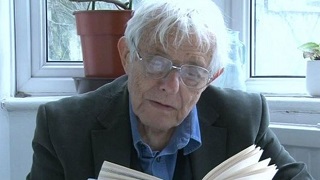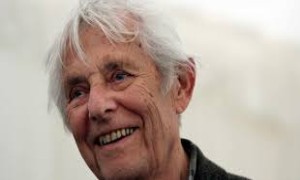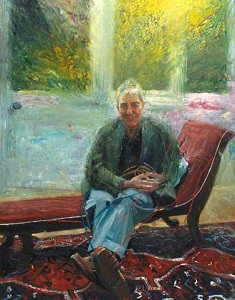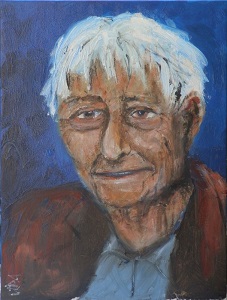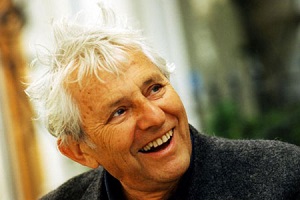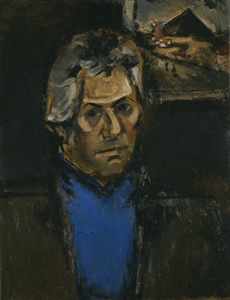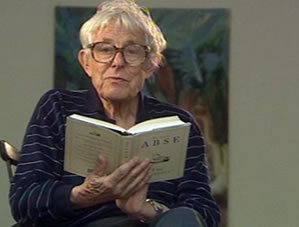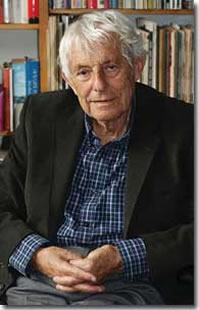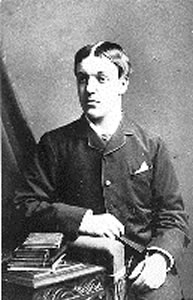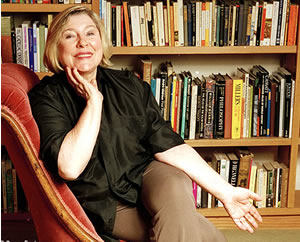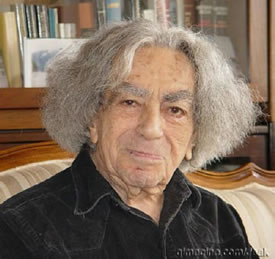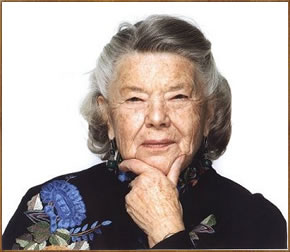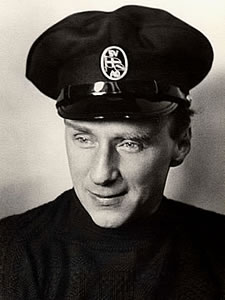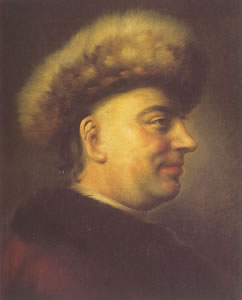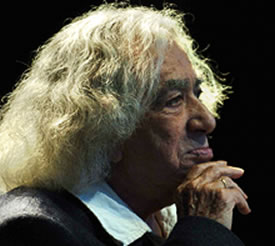De Nederlandse dichter en schrijver Jacobus Cornelis (Jaap) Harten werd geboren in Blaricum op 22 september 1930. Zie ook alle tags voor Jaap Harten op dit blog.
In de schaduw van hout
Wij waren niet nieuwsgierig
naar woorden en ook niet
naar cijfers, grijs als het haar
van de meester. Wij zaten
in de vergeelde foto
van een klas, een
ontbloeiend mechaniek
van jeugd.
De meesten onder ons
hadden houten ouders;
in de zomer vol meloenen en bessen
lieten zij hun schaduw na,
vol wantrouwen
als een vogelverschrikker die
toch altijd weer
verkeerd begrepen wordt.
En de dichte bossen
waar wij met een fluit op zak
in verdwenen; de hooiberg waar
wij koppig stoeiden met snelle, groene
spieren; en later
de nachten op hol
in het zadel van liefde: wisten
de houten beelden er iets van?
Nee. Of deden alsof.
Zij gingen met de kippen
op stok onder een paraplu
van zelfgenoegzaamheid.
Zij sliepen als runen.
De nacht, als honderd zwarte
katten, danste stug bijgeloof
op het koord van hun slaap.
Schlechte Zeit für Lyrik (Bertolt Brecht)
1
Al deze vragen:
de opgestoken duim van een bloemblad,
de naakte iris achter oogharen
die eklipseren voor het
zien, dat weer nieuwe
vragen oproept:
een braadpan vol kinderwoorden,
feeën van een bladzij losgescheurd
en voor 3 à 4 sekonden
kopulerend met een jongensbroek.
Waar zijn de lichtgewicht
kampioenen in demonie
die vanuit 1939
opeens vuur spuwen in dit gedicht?
Vriendjes als mieren
rondkruipend over de zolder,
ik mijn vaders kepi
opgeprikt als een grimas.
Erekties. Vechtpartijen.
Scherpe geur van oksels
zout als tranen.
Vragen.
Geen tijd voor lyriek
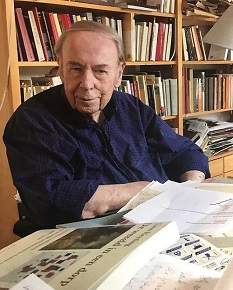
Jaap Harten (22 september 1930 – 2 december 2017)
De Britse dichter en schrijver Dannie Abse werd geboren op 22 september 1923 in Cardiff, Wales. Zie ook alle tags voor Dannie Abse op dit blog.
Not Adlestrop
Not Adlestrop, no – besides the name
hardly matters. Nor did I languish in June heat.
Simply, I stood, too early, on the empty platform,
and the wrong train came in slowly, surprised, stopped.
Directly facing me, from a window,
a very, very pretty girl leaned out.
When I, all instinct,
stared at her, she, all instinct, inclined her head away
as if she’d divined the much married life in me,
or as if she might spot, up platform,
some unlikely familiar.
For my part, under the clock, I continued
my scrutiny with unmitigated pleasure.
And she knew it, she certainly knew it, and would
not glance at me in the silence of not Adlestrop.
Only when the train heaved noisily, only
when it jolted, when it slid away, only then,
daring and secure, she smiled back at my smile,
and I, daring and secure, waved back at her waving.
And so it was, all the way down the hurrying platform
as the train gathered atrocious speed
towards Oxfordshire or Gloucestshire.
Failure
Writing should be dedicated living, and ordinary heroes go lame,
torn like bits of poems, bits of voices into the wind.
I should be vocal for all the dumb ; for the homeless be home,
for the hunted be shelter. Oh make this ink a land.
I should be forever new and tum towards them with pure surprise,
endow the lonely with gifts far lovelier than this look,
and cage their ragged shadows in my eyes
that fly down tearward. But only ghosts people this book.
Humanity, the earth is richer where you stand.
So I wish myself imagined, a young legendary sage
·possessed with worlds of blood and flesh, not this faltering hand
that limps in pain and poverty over each uncreated page.
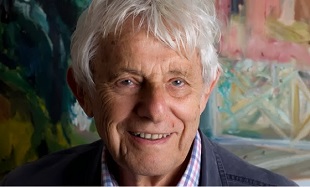
Dannie Abse (22 september 1923 – 28 september 2014)
De Nederlandse dichter, schrijver en criticus Lodewijk van Deyssel werd geboren op 22 september 1864 in Amsterdam. Zie ook alle tags voor Lodewijk van Deyssel op dit blog.
Uit: Jongensjeugd-schetsen
“Achter de schouders van den vader ging Adriaan door den gang. Het was hier stiller dan op straat. Van den wind was weinig meer te hooren. De gang was wit, maar het ganglampje was al op en dit maakte hier en daar goud-geele plekken op het wit, met breede, flauw goud doorwemelde, licht zwarte schaduw-randen. Het lampje was daar boven, aan het achter-einde van den gang, een kleine blank-geele vlam met een donkerder randje, met een, naar boven smaller, rond lampeglaasje, zoo doorzichtig als water, er om heen. Van boven eindigde het lampeglaasje met een open rontetje.
Aan de kleêrenkast gekomen, bergden zij hier hun kleêren in. Terwijl Adriaan met reikenden rechter arm de donkere kast in was, voelend met zijn hand de andere kleêren, waar-tusschen hij zijn jas aan den kapstok hing, hield hij zijn linker hand, recht opgestrekt en met zijn voorarm ook naar boven, tegen den rug van zijn vader aan, alsof dit bepaald noodig was om zich te houden bij het reiken.
Het heele huis was stil en op de trappen, tot boven toe, was niemand. Zij gingen de trap op, Adriaan achter zijn vader. De looper voelde zacht aan na de steenen van de straat en je kon de stappen bijna niet hooren. Alleen kwam nu en dan een van hun vier voeten tegen een looper-roede aan en dit gaf een geluid, dat prettig was om te hooren. Op het huiskamer-portaal brandde de groote lantaarn. Dit was het tweede licht in huis waar zij aan kwamen. Vader kwam met zijn hand naar achter zich, terwijl Adriaan achter hem liep, en nam zijn zakdoek uit een achterzak van zijn jas. Deze was groot en wit met vele kleine vlaktetjes en kromminkjes en rond gebogen vlakjes met veel butsjes en driehoekig uitstekende, alleenige dunne eindjes.
Voor de huiskamerdeur zag men nu het matje liggen in het licht. Dit was klein, lankwerpig en licht bruin en met een oranje rooden rand, en was hard en zacht onder je voeten.
De huiskamerdeur was nu geheel in ’t licht en over-dag, als de lantaarn uit was, altijd in donker. Je zag nu de post van de deur, die om de deur heen was en die aan dezen kant van de deur meer als een deurpost gezien werd omdat er overal witte, door het lantaarnlicht licht goud gekleurde, muur om heen was. Je zoû aan den anderen kant nooit er zoo aan gedacht hebben dat de huiskamerdeur een deur was en met een post er om heen zooals dat ook bij andere deuren is. De deur was hier ook met lichter kleur geverfd dan aan den binnen-kant. Hij was gesloten. De kruk was daar en onbewegelijk stil. En boven de deur was nu het goud aan het goud-lokkig jongens-kopje veel duidelijker.”
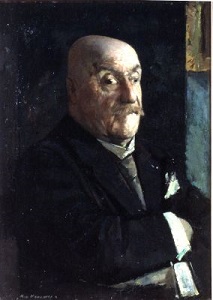
Lodewijk van Deyssel (22 september 1864 – 26 januari 1952)
Portret door Kees Verwey, 1941
De Australische singer / songwriter, dichter, schrijver en acteur Nicholas Edward Cave werd geboren in Warracknabeal op 22 september 1957. Zie ook alle tags voor Nick Cave op dit blog.
Uit: The Death of Bunny Munro
“He hears it now above the bombination of the air conditioner and it is sufficiently apocalyptic to almost arouse his curiosity. But not quite.
The watermark on the ceiling is growing, changing shape – a bigger breast, a buttock, a sexy female knee – and a droplet forms, elongates and trembles, detaches itself from the ceiling, freefalls and explodes on Bunny’s chest. Bunny pats at it as if he were in a dream and says, ‘Libby, baby, where do we live?’
‘Brighton.’
‘And where is Brighton?’ he says, running a finger along the row of miniature bottles of liquor arranged on the bedside table and choosing a Smirnoff.
‘Down south.’
‘Which is about as far away from ‘up north’ as you can get without falling into the bloody sea. Now, sweetie, turn off the TV, take your Tegretol, take a sleeping tablet – shit, take two sleeping tablets – and I’ll be back tomorrow. Early.’
‘The pier is burning down’, says Libby.
‘What?’
‘The West Pier, it’s burning down. I can smell the smoke from here.’
‘The West Pier?’
Bunny empties the tiny bottle of vodka down his throat, lights another cigarette, and rises from the bed. The room heaves as Bunny is hit by the realisation that he is very drunk. With arms held out to the side and on tiptoe, Bunny moonwalks across the room to the window. He lurches, stumbles and Tarzans the faded chintz curtains until he finds his balance and steadies himself. He draws them open extravagantly and vulcanised daylight and the screaming of birds deranges the room. Bunny’s pupils contract painfully as he grimaces through the window, into the light. He sees a dark cloud of starlings, twittering madly over the flaming, smoking hulk of the West Pier that stands, helpless, in the sea across from the hotel. He wonders why he hadn’t seen this before and then wonders how long he has been in this room, then remembers his wife and hears her say, ‘Bunny, are you there?’
‘Yeah,’ says Bunny, transfixed by the sight of the burning pier and the thousand screaming birds.
‘The starlings have gone mad. It’s such a horrible thing. Their little babies burning in their nests. I can’t bear it, Bun,’ says Libby, the high violin rising.”
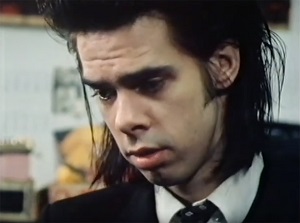
Nick Cave (Warracknabeal , 22 september 1957)
De Nederlandse dichter en schrijver Peter Drehmanns werd op 22 september 1960 in Roermond geboren. Zie ook alle tags voor Peter Drehmanns op dit blog.
Terwijl
Terwijl de trein te velde trekt
verdwijn je maximaal
in met fluweel beknuffelde banken
tussen Omsk en Otranto.
Terwijl de taxi’s talmen voor Termini
struikel je danig
de napalmnacht binnen,
koppeltekens boven je beduimelde ogen
accolades in je mondhoeken
een dubbele tong in je hand.
Terwijl de hotelkamer openscheurt
val je voluit
tussen de regels van het opengeslagen bed –
en op het nachtkastje troont het happy end,
het jachtgeweer van de schrijver
in de open mond van de dag
in de stofstorm van wat weg was
van wat drab was.
Nog zowat
en dat de conducteur steeds opnieuw
langskomt en je kaartje bekladt
en dat het stof nooit ophoudt
neer te dalen en dat het zicht beperkt
blijft rondkolken en dat de konijnen zachtjes
sudderen en dat je rechtop moet lopen
en dat de bitten beschuimd zijn
in de tuigkamer en de teugels onontwarbaar
en dat de paarden de stal niet meer ruiken
en dat het sneeuwt in het apenhuis
en dat mijn meisje haar vingers zoekt
in het lange gras bezijden de roofdierverblijven
en dat de rantsoenkaarten verkruimelen
tussen mijn tanden en geen touw meer valt
vast te knopen aan welke geloofsrichting
dan ook
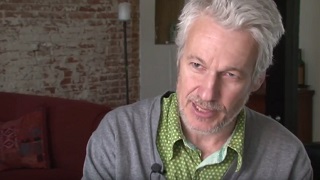
Peter Drehmanns (Roermond, 22 september 1960)
Onafhankelijk van geboortedata
De Amerikaanse schrijver Nathan Hill werd geboren in Cedar Rapids, Iowa, in 1976. Zie ook alle tags voor Nathan Hill op dit blog.
Uit: The Nix
“All I actually know right now,” the reporter says, “is that things were thrown.”
“What things?”
“That is unclear at this time.”
“Was the governor struck by any of the things? Is he injured?”
“I believe he was struck, yes.”
“Did you see the attackers? Were there many of them? Throwing the things?”
“There was a lot of confusion. And some yelling.”
“The things that were thrown, were they big things or small things?”
“I guess I would say small enough to be thrown.”
“Were they larger than baseballs, the thrown things?”
“No, smaller.”
“So golf- ball- size things?”
“Maybe that’s accurate.”
“Were they sharp? Were they heavy?”
“It all happened very fast.”
“Was it premeditated? Or a conspiracy?”
“There are many questions of that sort being asked.”
A logo is made: Terror in Chicago. It whooshes to a spot next to the anchor’s ear and flaps like a flag in the wind. The news displays a map of Grant Park on a massive touch- screen television in what has become a commonplace of modern newscasting: someone on television communicating via another television, standing in front of the television and controlling the screen by pinching it with his hands and zooming in and out in super- high definition. It all looks really cool.”
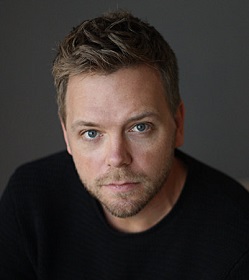
Nathan Hill (Cedar Rapids, 1976)
Zie voor nog meer schrijvers van de 22e september ook mijn vorige blog van vandaag.

